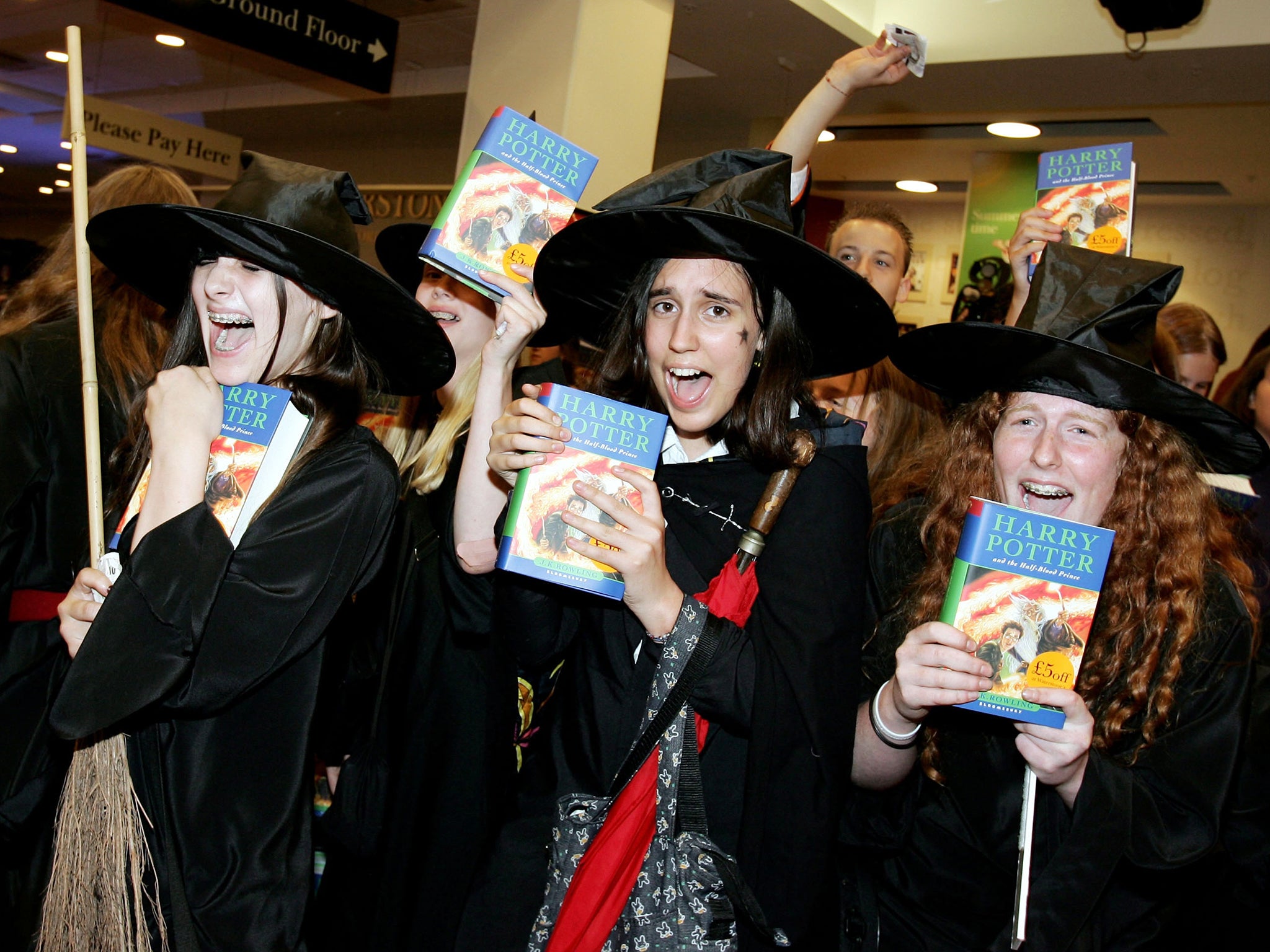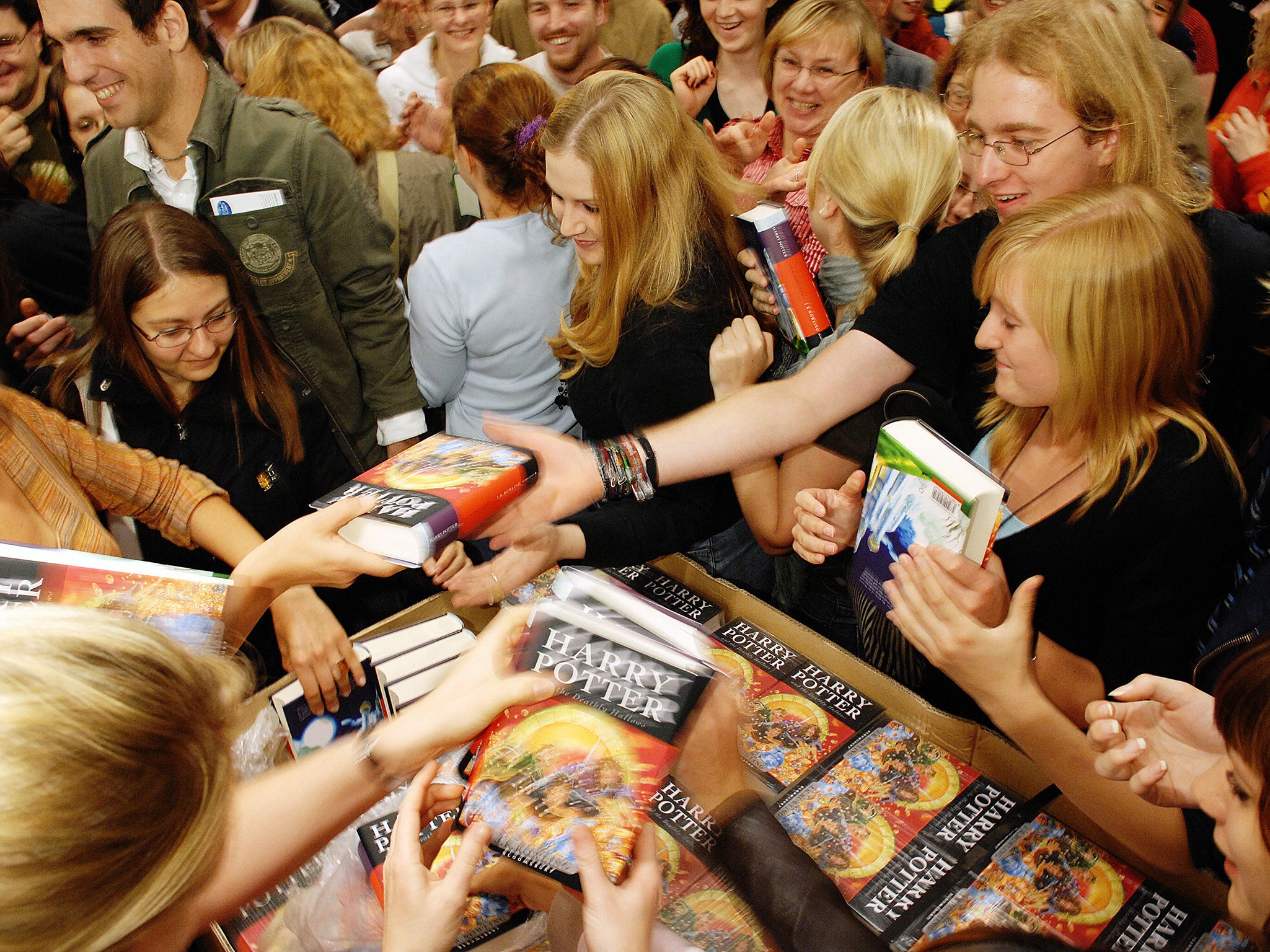Harry Potter was the last great pre-internet phenomenon
Bookshops opening at midnight, fevered anticipation, reading parties – JK Rowling’s novels showed us what cultural obsession could look like in an age before on-demand. We’ll never see its like again, says Jessie Thompson


Your support helps us to tell the story
From reproductive rights to climate change to Big Tech, The Independent is on the ground when the story is developing. Whether it's investigating the financials of Elon Musk's pro-Trump PAC or producing our latest documentary, 'The A Word', which shines a light on the American women fighting for reproductive rights, we know how important it is to parse out the facts from the messaging.
At such a critical moment in US history, we need reporters on the ground. Your donation allows us to keep sending journalists to speak to both sides of the story.
The Independent is trusted by Americans across the entire political spectrum. And unlike many other quality news outlets, we choose not to lock Americans out of our reporting and analysis with paywalls. We believe quality journalism should be available to everyone, paid for by those who can afford it.
Your support makes all the difference.It was just a book back then. There were no queues. No grown adults in costumes, waving wands. No blockbuster movie franchise, no video games, no theme parks. Twenty-five years ago this weekend, the first Harry Potter book was published, having previously been rejected by 12 publishers. The legend goes that Bloomsbury chief executive Nigel Newton waved Harry Potter and the Philosopher’s Stone through because his daughter had enjoyed reading the manuscript. Surely, 500 million copies later, she should be getting a cut.
No one can predict what our next big cultural phenomenon will be. What we do know, though, is that it won’t ever be like that again. Harry Potter was the last great collective obsession of an analogue age. It came from a time before binge-watching, before memes, before Amazon Prime. We used to do this thing called “waiting”. Our online, on-demand culture has changed habits so fundamentally that it’s remarkable to think that a significant number of those 500 million readers actually went to a bookshop to get their copies.
In fact, those trips to the bookshop are really the things I remember. So ravenous were readers’ appetites that, by the fourth book, the shops were opening at midnight so the reading could start within seconds of release. Those midnight parties didn’t happen before Potter, and haven’t really happened since. No book has come close to that level of anticipation, of course, but also now you don’t have to go anywhere to get things almost immediately.
When I cast my mind back to 11-year-old me, sitting in my bedroom in Maidstone, getting swept away by it all, that sense of occasion is what’s imprinted on my mind; I have less recollection of the stories themselves. The vague summary I maintain about what happened in Harry Potter is: three pals have to go to school (annoying) where they learn to be wizards (more worthwhile). While doing this, they try to kill a guy so evil that no one says his name (a necessary task, if melodramatic behaviour). Also, there’s an owl.
The early books came out when I was of prime Potter readership age. Except, at first, I didn’t want anything to do with them. If any adult suggested I read these Harry Potter books, I’d stare them out and say something along the lines of “Ugh, I’m not a geek!” I’d scowl. I’d saunter. I’d go and spend some time looking at my posters of Lee from Blue.
Except one day, I was at a friend’s house and was caught unawares. We were plonked in front of a video of the first film. The twinkly music began. I frowned, huffed, fixed my eyes to the wall. And then… my resolve started to weaken. On the screen was a giant man with a magical umbrella. He was telling an 11-year-old kid that his aunt and uncle had been lying to him. That he was a wizard. And they were going wand shopping! It was game over. Stubborn, surly me had to come to terms with the fact that Harry Potter was… quite good. By the weekend, I had read the first three books and was pining for the next one.
Like millions of my generation, the books ended up becoming an unexpected companion through my adolescence. When the final book was released, I was 16. The day before it hit bookshops, my first ever boyfriend brutally dumped me by instant message on MSN. Reeling from the news, unable to eat or sleep, I could contemplate one thing only: allowing my dad to escort me to WHSmith at midnight to claim my copy of Deathly Hallows. I woke up the next day and practically snorted the pages, reading until my eyes hurt, displacing my doom for 24 hours. How do the books end? I have no memory.

Some of the hysteria of Pottermania now seems quaint. JK Rowling’s editors have described secret meetings, where manuscripts were handed over in Sainsbury’s bags before being put into a safe. In 2000, critic Anthony Holden published an epic slag-off of the series in The Observer. (My favourite bit is when Jerry Hall and Imogen Stubbs, his fellow judges on a children’s fiction prize, tell him their kids love Potter. His response: “‘You should be reading them Beowulf,’ I snapped testily.”) The Observer postbag was subsequently deluged with letters from youngsters, telling Holden how wrong he was. “Although I may be only 10, I still count and there are plenty of others who do not agree with you,” wrote one. Rowling’s legacy may now be under debate, thanks to her habit of sharing controversial opinions and retrospectively amending her characters, but in 2011, she was named as one of Britain’s national treasures, alongside Paul McCartney and David Attenborough.
By the final book, published in 2007, a savage trend began in which young men filmed themselves driving by queues of eager fans at bookshops, shouting spoilers at them. “Snape kills Dumbledore!” they yell. “You bitch!” someone screams back. Another fan starts to run after their car, ready to attack. It was intense, fanatical, unprecedented.
None of this is to say that our collective cultural obsessions are no longer fun. There are Game of Thrones memes that still make me cackle. The words to Hamilton were embedded in my brain before I ever saw the show. And there’s no point watching Love Island if you don’t read the tweets. But it’s different: louder, brasher, more minded towards slight mockery. I feel nostalgic for Potter as the last pre-internet phenomenon, the like of which we won’t see again. It wasn’t just the sense of ceremony – the anticipation, the trip to the bookshop – but the lack of noise. The experience was quieter, more personal. No screens. No spoilers (bitches aside). No running commentary from the author online. Five hundred million people might have read it. But most of the time, it was just you and a book.



Join our commenting forum
Join thought-provoking conversations, follow other Independent readers and see their replies
0Comments